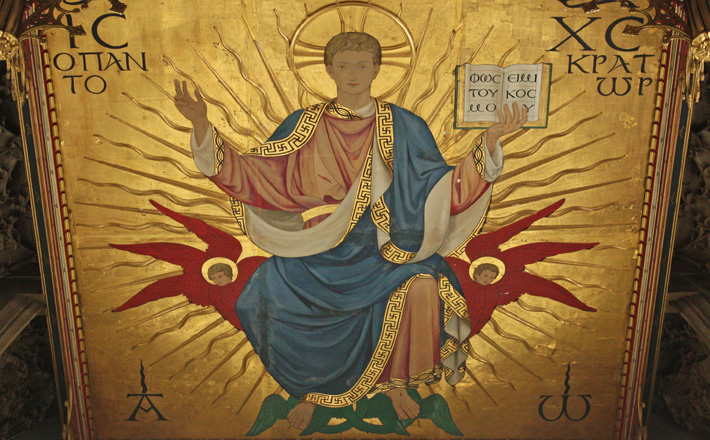Commentary on Luke 6:20-31
In this year 2016, we are experiencing, perhaps enduring is the better word, one of the surliest presidential races in years.
One of the most painful dynamics of the contest is the near daily barrage of revelations of hostility, cruelty, dismissiveness of “others:” women, Catholics, Mexicans, Asians, losers, Republicans, Democrats, Independents, Russians, or Syrians.
It is remarkable that we look at Jesus’ inaugural address as the Gospel text for All Saints Sunday. In Jesus’ first sermon (Luke 4:16-21, 23-28), after he had read from Isaiah, he declared that he had been anointed like the prophets before him for specific purposes: to bring good news to the poor; to proclaim release to prisoners; to cause the blind to see; and to proclaim a “jubilee year,” a year of favor before God.
Jesus’ understanding of his own call, vouchsafed and perhaps revealed by the overwhelming presence of the God’s Holy Spirit at every step along the way (Luke 1:35; 3:22; 4:1, 14, 18) echoes Mary’s song (Luke 1:46-55) as Mary combs Scripture for an understanding of what it will mean for her son to sit on the throne of David (Luke 1:32). Throne-occupying is for serving God’s purposes of shalom.
As Mary sang it, the song of God’s promise was a song of God’s faithfulness to God’s people Israel. As Jesus presents it in Luke 4, God’s promises of restoration and the creation of wholeness, God’s saving promises, are for Israel AND not-Israel. They are for all God’s people. Yet, such promises of shalom will bring adjustment, changes. And changes so often generate fear; watch Jesus’ fellow villagers react with violence to the changes he promises.
By the time we get to Luke 6:20-31, Jesus has chosen his cabinet (if you will forgive the political analogy), demonstrated God’s commitment to healing, and has begun to gather a reputation that brings folks to him in droves. Like Moses who was Jesus’ forebear in closeness to God, in faith and leadership, Jesus has both gone up the mountain and then come down to deliver a clear statement of God’s will for the people. Jesus describes how the world will look as the world and all God’s creatures are brought around to belong fully to God. It is a moment of faithful imagination of God’s worldwide shalom which has come near in Jesus himself (Exodus 32:15; 34:29).
Luke has skillfully brought us step-by-step to a place where we must take these words of the Jesus’ sermon on the plain with utter seriousness. These are words that describe for Jesus’ followers a different world, a politeuma from heaven, as Paul describes it (Philippians 3:20).
There is, then, a kind of divide between the blessed and the woeful. It is, however, precisely NOT the divide that our world would create between winners and losers, successful and unsuccessful, elites and non-elites. The blessed are those who have caught at least a glimpse of God’s future and trust that it is for them. The blessed may be poor or needy, even weeping in life by the standards we humans have in our very bones, but they are blessed in both trust in God and in God’s future, in their hope of justice. The woeful are those who have forgotten that the “fear of the Lord is the beginning of wisdom.” The woeful are those who say “yes” to the title question of an old song, “Is that all there is?”
Luke’s text uses direct address (with a plural and perhaps corporate “you”) and doesn’t mince words about being poor, hungry, grief-stricken, and the like. We do not have to work very hard to imagine the lives of 1st century Palestinian Jews as very susceptible to poverty, hunger, and loss. Nor do we have to work very hard to imagine the lives of many of our 21st century sisters and brothers equally beset by harsh realities. As those in need were all around Jesus, having come for both hope and healing, so they continue to need both in our own age.
We come to the real question for ourselves: what does this text heard on All Saints Sunday offer to us? Remembrance, love, and honor for our forebears? Yes, indeed. We are called to remember saints who have gathered around Jesus in every time and place, people with needs and hopes, people who caught at least a glimpse of a world more fully God-shaped than the one they lived in.
We come from a people and from individual persons to whom we owe much of who we are and much of who we long to be. Our history and our imagination of God’s reign look back to the promises of God as Jesus spoke them on a Plain long ago. Our history and imagination look back to our more recent forebears who carried the faith, who taught it to us. These folk gone before remain vital in the great communion of God’s people we celebrate at All Saints.
There is more for us, though, much more. This text points always ahead into God’s coming future, the fullness of which we seek to know. It is for all the saints who gather now to be reminded that the hope of the world is not for the same old thing to continue, not for all of us to become the elites, never to worry about illness or loss. The hope for God’s world is that we lean into God’s future together. Jesus delivers this sermon not as an eschatological guide book, but as a guide for daily life right now — for all the saints.
The message that Jesus brings and is, is a tough one for us humans. It calls for change of vision, change of behavior, change in our very bones. Resistance to and fear of change surely is one of the main drivers in the political world in the autumn of 2016. Fear of how the needy will deprive us of that for which we have worked so hard builds psychological walls between us and them: such fear is symbolized by the yearning to create a physical wall as well.
So many of us yearn to build perfect walls of rigorous vetting for would-be immigrants. We would create various economic strictures that will wall in our profits and protect jobs. There is a clear need in all this for a sense of safety and hope, but the means to such shalom are of this world and must fail. Seeking to protect ourselves and keep what is” ours” will fail: so Jesus warns us in this passage.
In a recent essay Willie James Jennings, reminds us that elections are about our imagination. He calls upon Americans and especially Christians to “claim the power of life together precisely at the site of threat and fear.” This we can do, Jennings insists, because an election is an opportunity to re-imagine a world and seek to set the stage for the world we imagine.
Political elections are about our imagination. They are less about our real life in the world and much more about our perception of our life in the world. In a democracy, they provide astounding moments of creativity that get used in ways both breathtaking and disturbing.1
Jesus is not talking about political elections, of course. He is talking about an astounding time of creativity, both breathtaking and disturbing in the world he occupies with those first century folks, a time of change that draws people to him and terrifies others. Our Christian perception of life in God’s world hews close to Jesus’ words that constitute the inauguration of his dangerous ministry of vision and purpose.
As the saints of the past have glimpsed this truth of life in God’s world and handed it on to us, so we glimpse that same truth and our calling into God’s world, perceiving all people as God’s people. Free to acknowledge that our lives and our needs, our safety and shalom are in God’s hands, we dare to imagine and engage the world in God’s name. Thanks be to God.
Notes:
1 Willie James Jennings, “Aiming the World Toward Hope,” in Reflections Fall 2016, 11-12.


November 6, 2016